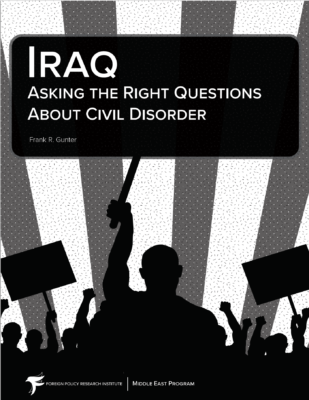A nation must think before it acts.
Download Iraq: Asking the Right Questions about Civil Disorder
Since October 1 of last year, over 600 Iraqis have been killed and thousands injured in protests throughout the country. The accompanying political and social chaos has strengthened efforts by other nations to interfere in Iraq with deadly effects. What caused this sudden surge of violence? There are a wide range of political, economic, and social problems in Iraq, such as corruption, lack of public services, and mass unemployment. But most observers focus on disputes among the Iraqi leaders or among various ethnic or religious groups as the causes of current civil disorder in Iraq.[1]
Is asking about causes really the right question? All countries have disputes about important issues. And in most countries, these disputes are resolved or at least ameliorated by congressional or parliamentary debate and decision—by the political process. In these countries, non-violent protests may play an important role in getting decision makers’ attention, but violence on the part of the protesters or the government is rare.
A better question concerning the current violence in Iraq is why do disputes in this country tend to travel in a downward arc from parliamentary debate to non-violent protests to widespread civil disorder and, finally, in extremis, to civil war. In part, the current violence in Iraq appears to be part of a global or regional trend away from state-on-state conflict towards civil conflict. As a result, of the 259 wars that have occurred worldwide since 1989, 95% have been civil conflict, not state-on-state. These civil wars tend to last four times longer than state-on-state wars. Civil conflicts do more damage to society, polity, economy, and lead to greater losses of life. In the Middle East and North Africa (MENA) states, an estimated 4 million persons have died in civil conflicts since World War II.[2] Currently, there are serious civil conflicts in many MENA states, including Iraq, Libya, Morocco, Syria, Turkey, West Bank/Gaza, and Yemen.
[1] For example, see, Randa Slim (2019), “Iraq: A Conflict Over State Identity and Ownership” in Paul Salem and Ross Harrison (eds.), Escaping the Conflict Trap: Toward Ending Civil Wars in the Middle East, Washington, D.C.: Middle East Institute, Chap. 8, pp. 161-186.
[2] Paul Salem (2019), “Middle East Civil Wars: Definitions, Drivers and the Record of the Recent Past” in Paul Salem and Ross Harrison (eds.), Escaping the Conflict Trap: Toward Ending Civil Wars in the Middle East, Washington, D.C.: Middle East Institute, pp. 1-31.




